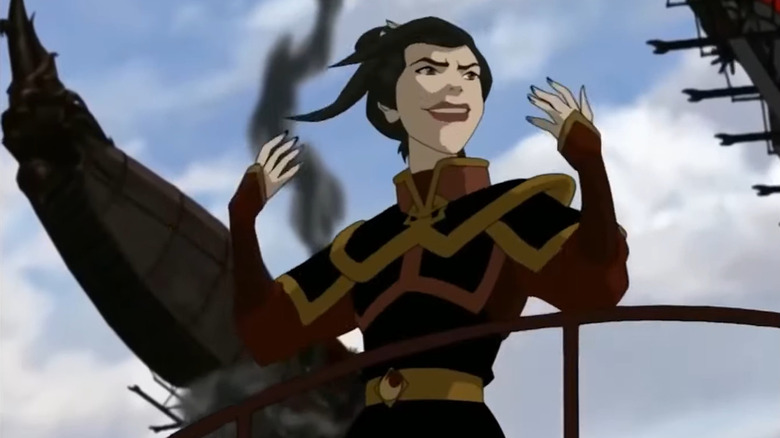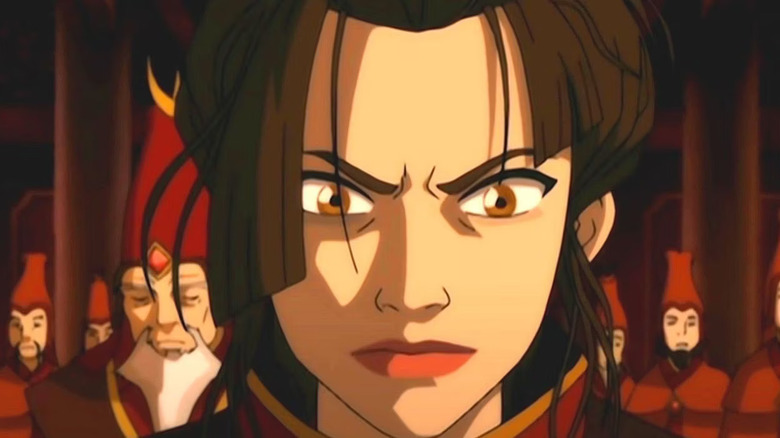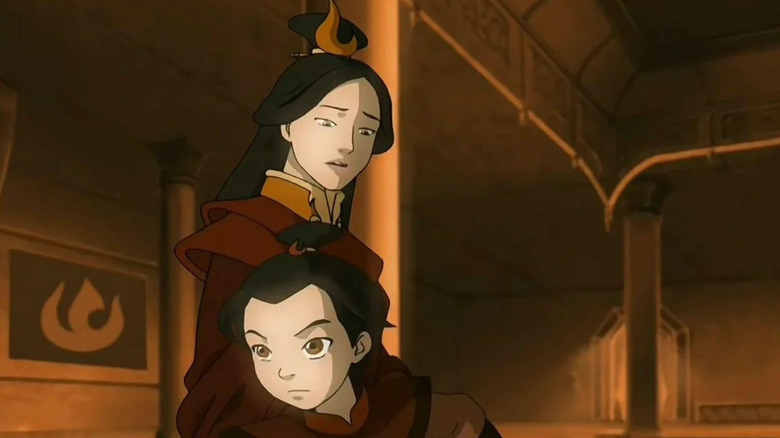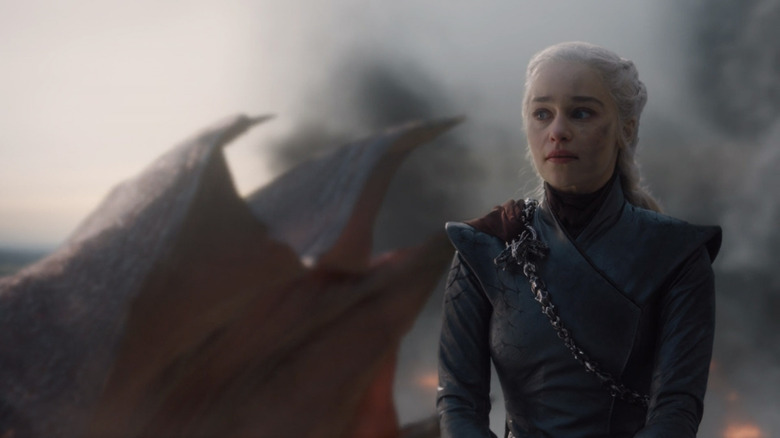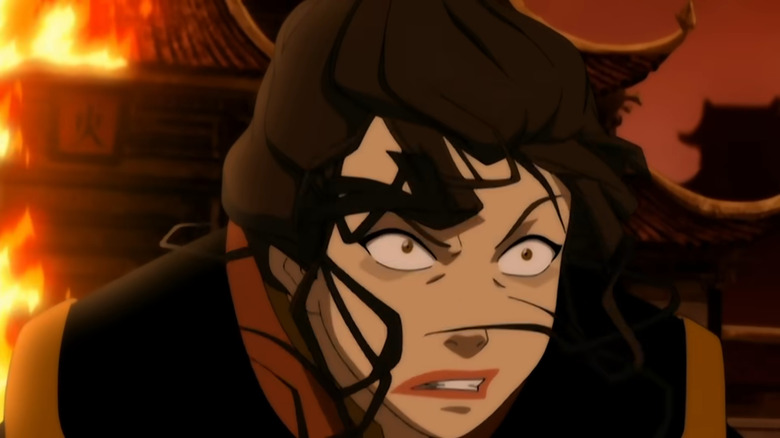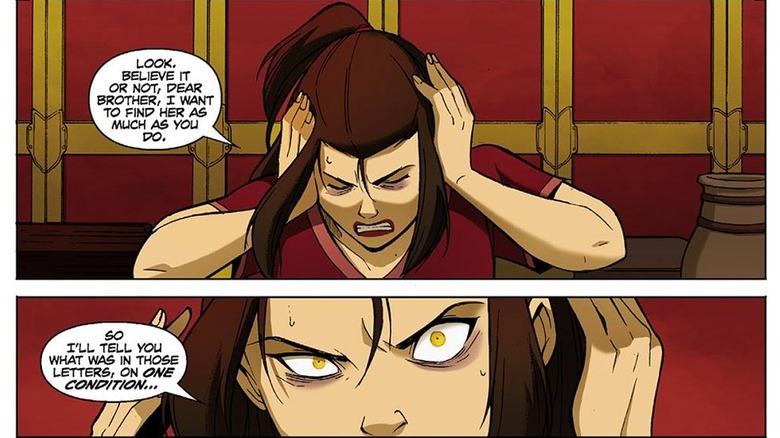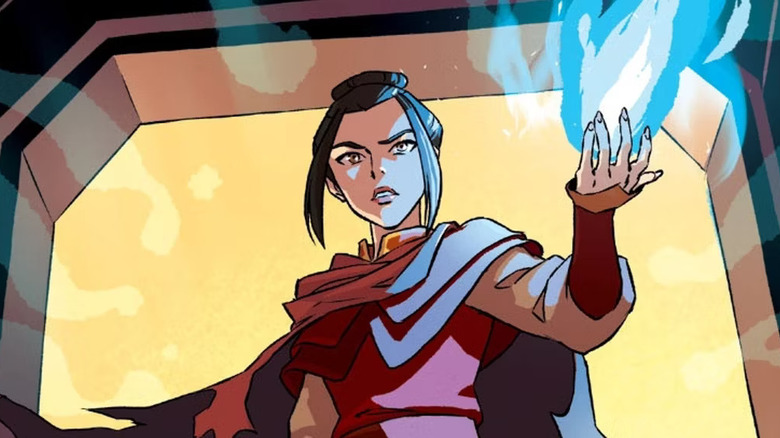How Game Of Thrones' Biggest Blunder Followed In Avatar: The Last Airbender's Footsteps
We may receive a commission on purchases made from links.
Last month, film critic Guy Dolbey tweeted out a controversial take for all the world to see:
"'Avatar: The Last Airbender' was a cool cartoon for children that an entire generation of adults talks about like 'Citizen Kane.'"
Despite its 46,000 likes, the tweet invoked a lot of anger, with people calling Dolbey a joyless hater and a needless contrarian. "Not everything people love a lot is overrated," said heartbroken YouTuber Big Joel in response to the take, and he certainly has a point. "The Last Airbender" is a legitimately great show that so many people still love even fifteen years after its finale; to trash it for seemingly no reason out of the blue certainly seems a little joyless.
Still, the hype around "The Last Airbender" is admittedly a little over-the-top. It's one of the best things Nickelodeon has ever done, sure, but it's definitely not perfect. The series still gave us the occasional clunker episodes like "The Last Divide," the Aang/Katara romance was always pretty forced, and the resolution to Aang's final battle with the Fire Lord was a bit of a cop out. Once you expand the show's competition to include TV series intended for adults, it's definitely not the best show ever.
Another significant flaw in the series — one of the biggest things I'd point to in the case for why the show might be a little overrated — is the resolution of Azula's character arc in the final season. The always confident, unflappable Azula suddenly starts losing her marbles at the tail end of season 3, providing a rushed, convenient manner for Zuko to take her down in their final fight. Years later, HBO's "Game of Thrones" would make a similar stumble in its storytelling.
When Azula starts slipping
The moment where Azula's "going crazy" arc begins is at the end of the "Boiling Rock" two-parter, where Azula's two friends (Mai and Ty Lee) betray her, one after the other. We can tell that Azula is legitimately shaken by this event, because the next time we see her, her perfectly consistent hairstyle is now longer and unkempt. Azula's hair quickly becomes her own version of Dorian Gray's portrait, giving us the real state of her declining mental health even as she tries to act like she's perfectly fine.
Early into the four-part finale, Azula hears she's been promoted to become the nation's Fire Lord. It's a title she's been coveting since the beginning, but the bequeathment only seems to make her spiral further. By the time she's fighting Zuko in Part 3, she's cut up half her hair and has started banishing people from the Fire Nation for the slightest perceived offense. Although this whole journey technically spans across five or six episodes, it's all told within maybe 10 or 15 minutes of screen time. It's a startlingly short amount of time for a character to basically transform into the Joker, and it's especially strange considering how static she was throughout the initial 95% of her time on the show.
An episodic move in a serialized show
The choice is baffling because "Avatar: The Last Airbender" had otherwise been great at doing subtle long-term character arcs — just look at Zuko. The decision to save so much of Azula's shift for the finale feels like something you'd see on a strictly episodic show, not one that had just given Zuko one of the greatest planned-out TV character arcs of all time. If the series wanted to start planting Azula's descent into madness earlier, the writers definitely had the skills to pull it off, but they never seemed that interested in giving Azula the same depth as her brother.
Yes, as fans have pointed out, Azula's backstory is tragic and complicated, and it perfectly explains the way she is. Like Zuko, she had a father who trained her to be as evil as possible and rewarded her for her many misdeeds. Unlike Zuko, she never felt the love of her mother nor got the encouragement of her loving uncle. By the finale, she's still a 14-year-old girl who's been emotionally abused and groomed into a fascist war criminal; on paper, there's a lot to work with here. But the show itself never took any of that seriously before the finale, and when it did, it was usually just a brief moment followed by a joke. "My own mother thought I was a monster," Azula says in "The Beach." But then the melancholy background music cuts short and she adds, happily, "She was right of course, but it still hurts."
Most of what Azula goes through in that finale is well-written, well-animated, and amazingly well-performed, but it's all undermined by how this was the first time in the show where Azula was written as an actual three-dimensional character.
Not the last mental breakdown in a show's final act
If you haven't watched "The Last Airbender," a lot of Azula's story arc probably feels familiar to you. 11 years after Azula was left chained to a drainage gate shrieking and sobbing, Daenerys from "Game of Thrones" was having a similar mental collapse. Like Azula, Daenerys appeared to be somewhat stable throughout the first 95% of her show; she burnt a few people alive here or there, but never without an understandable reason. Then, at the last second, just as Daenerys was about to achieve everything she's been fighting for her whole life, she turns into the Mad Queen.
A lot has been written about the many problems with Dani's arc. The general consensus is not necessarily that she shouldn't have had a villainous heel turn at all, but that the show should've at least dedicated more time to properly establishing this turn and dealing with the aftermath. Not only should her downward spiral have begun earlier, but it would've been interesting if Daenerys had shown any sort of remorse or self-awareness in the finale. Because the show was in such a race to the finish line, however, the writers kept her in a heightened state to make Jon Snow's fatal decision quicker and easier.
Azula's arc is a lot less controversial, mainly because "The Last Airbender" never indulged us with any idea that Azula might be a hero, but the similarities are still clear. Both involve a major female character going crazy just as they're getting the full power they've always wanted; both directions involve a familiar, tired trope.
Women and power, 'not a good fit'
There's that old saying: "Power tends to corrupt, and absolute power corrupts absolutely." Yet with major female characters in these sorts of stories, they never usually get to reach that state of absolute power. The X-Men comics' Jean Gray is about to become a god before she kills herself to avoid taking on the role. Daenerys is about to claim the Iron Throne, before she snaps and disqualifies herself from being a worthy ruler. When male characters go mad with power, they usually get to at least enjoy said power for a little while first. Meanwhile, narratives about powerful women tend to revolve around stopping them before they can get that full leadership position in the first place.
The writing of so many female characters in mainstream fiction tends to reinforce the whole "power makes women crazy" trope that's been around for centuries. That's not to say Azula's arc was motivated by sexism — especially after the spin-off "Legend of Korra," you can probably trust the showrunners enough to assume otherwise — but if you're going to use such an old trope with such troublesome roots, you can at least handle it a bit more smoothly than how "The Last Airbender" handled it. And you can definitely do better than "Game of Thrones."
If they'd made Daenerys less bonkers in the finale, Jon would've been dealt with a genuinely difficult, interesting conundrum; if Azula hadn't had a total meltdown in her finale, Zuko would've been able to properly demonstrate his growth as a bender. He could've beaten her because he'd grown stronger, not because she'd suddenly grown weak. Both shows' finales are trying to be thoughtful and meaningful, but the full embrace of this stale trope undermines their efforts.
Where Azula goes from here
Besides the rushed nature, the other part of Azula's spiral is the natural question it invokes: Why is this character deemed beyond redemption? She's so young, so clearly molded by her environment. They could've still had her mentally snap and be defeated by Zuko and Katara, but what if they'd given her a final scene near the end of the finale, one that gave us some sort of glimpse of where Azula goes from here? Something to imply that, much like Zuko's low point when he was maimed and banished by his father, this doesn't need to be the moment that defines her. Instead, the show leaves Azula in the middle of a total nervous meltdown, leaving viewers with the impression that this is it for her, that she's a lost cause forever.
The show telegraphs this decision as early as season 2's "Bitter Work," in which Zuko complains about Azula to Uncle Iroh, adding, "I know what you're going to say, she's my sister, and I should be trying to get along with her." But instead of confirming this, the famously wise and compassionate Iroh instead responds, "No. She's crazy, and she needs to go down."
Iroh has always been the show's moral guide, its voice of wisdom. When he says Azula can't be saved, we're supposed to believe him. But as the show goes on and we learn more about Zuko and Azula's early childhood, Iroh's dismissal of her feels increasingly, uncharacteristically harsh. It seems like the main reason Azula's so terrible is because she's never had an Uncle Iroh there to guide her in the right direction, not because of anything inherent in her soul.
Do the comics offer a better ending?
If Azula's ending rubs you the wrong way, you can at least take solace in the fact that there are a series of comics that leave her in a slightly less depressing place. Throughout the three-part storyline "The Search," released in 2013, we follow Zuko as he reluctantly releases Azula from her mental institution. Why does he do this? Because he's trying to find his long-lost mother, and she's the only one who can help him.
"The Search" is probably Azula at her most fascinating. She's still evil, of course, but she's in a weakened state, convinced that her mother's been scheming behind the scenes to ruin her life at every turn. Azula's arc here ends with her confronting her mother and lashing out at her and Zuko, only to be met from both of them with kindness and sympathy. The fact that her mom and brother both simply want her to be happy, even after everything she's done to them over the years, is too much for Azula to handle. She runs off, seemingly wrestling for the first time with the idea that she doesn't have to be evil.
The comics don't seem that interested in a straightforward redemption arc, however: The next time Azula shows up (in "Smoke and Shadow"), she's basically running an evil cult that kidnaps children. (She doesn't harm them or anything, but still: Not cool, Azula!) She reveals to Zuko at the end that she no longer wants the throne, but instead plans to dedicate her life to turning Zuko into a harsher ruler, as much like his evil father Ozai as possible. It looks like redemption isn't in Azula's cards any time soon, but hey, at least the comics gave her a chance at it.
Why Azula still works
There's still one final chapter for Azula on the horizon: A new graphic novel "Azula in the Spirit Temple" is set to release this September. We don't know whether Azula will continue down her devious path in "Smoke and Shadow" or return to the seemingly redemptive path shown in "The Search," but until the comics come out, she still has a chance.
That's the big thing that separates Azula's conclusion in her show from Daenerys'. For the former, redemption is still possible. There are no potential spin-offs to follow Daenerys after the end of the series; the closest thing we'll get is if George R.R. Martin ever finishes the books and gives the character a different ending. Killing major characters might be a big part of what made "Game of Thrones" so popular in the first place, but it's also a bit of a cop out; how Daenerys would cope long-term with the realization of what she's done to King's Landing is a genuinely interesting question, one the finale denied us any chance of exploring.
"The Last Airbender" might've done this basic story arc first, but especially with subsequent comics, it's handled it a lot better than the HBO show's later swing at it. And even if Azula's arc was rushed, her characterization in the finale is still fascinating, deeply emotional, and quite possibly the darkest thing the Nickelodeon show had ever done. Both shows may have used the same tired trope, but somehow it was the kids' show that handled it with far more grace and maturity. So while the show might not be quite on the same level as "Citizen Kane," "Game of Thrones" showed us that it could've been so much worse.
